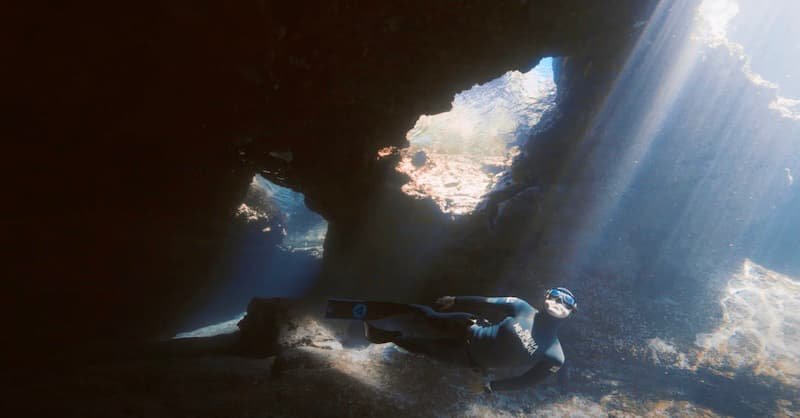
 Nick Pelios
Freediver, Creator
Nick Pelios
Freediver, Creator

 Nick Pelios
Freediver, Creator
Nick Pelios
Freediver, Creator
Freediving in caves is an extreme sport that involves diving underwater without the use of scuba equipment and exploring the interior of underwater caves. This activity requires specialized training and equipment and is considered to be one of the most dangerous forms of diving. Freediving in caves can be challenging due to the unique conditions that exist in these environments. For example, the water may be very cold and murky, with low visibility and strong currents. The caves may also be very deep, with narrow passages and tight spaces that require careful navigation.
To participate in freediving in caves, divers must have extensive training in safety techniques, such as proper breathing and equalization techniques, and must be able to remain calm and focused under stressful conditions. Additionally, they must have specialized equipment. Despite the risks involved, freediving in caves can be an exhilarating experience for those who are prepared and skilled enough to undertake it. However, it is important to note that this activity should only be attempted by experienced divers who have received proper training and are familiar with the risks and safety protocols involved.

Safety considerations: Freediving in caves requires advanced safety training and equipment, and it is considered one of the most dangerous forms of diving. Some of the risks involved in this activity include getting lost or disoriented in the cave, running out of air, and encountering dangerous marine life. It is essential for divers to have a safety line and to stay within a designated safety zone.
Technical skills: Successful freediving in caves requires technical skills, such as proper buoyancy control, equalization techniques, and the ability to dive deep and navigate through narrow passages. Divers must also be able to remain calm and focused in the face of unexpected situations.
Physical demands: Freediving in caves is a physically demanding activity that requires significant endurance and strength. Divers must be in excellent physical condition and be able to hold their breath for extended periods of time.
Environmental impact: Freediving in caves can have a significant impact on the fragile underwater environment. Divers must be mindful of their impact and take steps to minimize their footprint, such as avoiding contact with marine life and not disturbing the sediment on the cave floor.
Benefits: Despite the risks involved, freediving in caves can be a rewarding and exhilarating experience for those who are prepared and skilled enough to undertake it. It can provide an opportunity to explore unique underwater environments and to push personal limits.